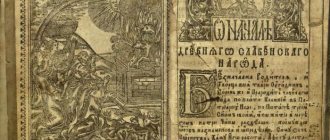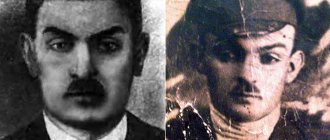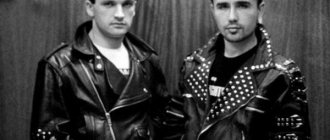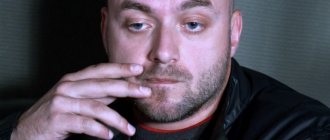Views: 341
Pyotr Velyaminov is a Soviet-Russian theater and film actor with an extraordinary destiny. In his early youth, he ended up in Stalin's camps for a crime he did not commit. There he learned acting from imprisoned actors and subsequently became one of the country's most famous artists.
Peter was born in Moscow on December 7, 1926, into the family of former tsarist officer Sergei Petrovich Velyaminov and a noblewoman by birth, Tatyana Ermilovna Divnova. In addition to their son, they had an eldest daughter, Ira. The father was the scion of an aristocratic family with almost a thousand years of history, the founder of which was the nephew of the Norwegian king Haakon II.
Sergei Petrovich and Tatyana Ermilovna Velyaminov with their daughter Ira and son Petya. Photo dubikvit.livejournal.com
Sergei Petrovich accepted the revolution and from 1918 served in the Red Army. He rose to the rank of lieutenant colonel and commanded a battalion of the Proletarian Division, but his services to the new government did not save him from paying for his “blue blood.” Velyaminov Sr. was repressed twice: he spent six years on the construction of the White Sea Canal, and twelve years in forced labor camps (and the second time he was arrested when he came on leave from the front). And Velyaminov volunteered for the front at the beginning of the war with Germany.
After his release in 1956, Sergei Petrovich returned to Moscow and was completely rehabilitated with the return of his officer rank.
Members of his family (except for his daughter Irina) were also subjected to repression. In March 1943, 16-year-old Peter was arrested, who did not even have time to graduate from school. The young man’s entire guilt was that he was caring for his neighbor’s daughter on the landing and was entering his house. After the neighbor's arrest, everyone who visited his apartment came under suspicion.
Photo lhistory.ru
Peter was detained on the street and brought to Lubyanka. He wasn’t even scared, because he was sure: “the authorities will sort it out.” But after several interrogations, the young man realized that his words had no meaning, and the investigation was nothing more than a farce. Velyaminov was accused of “treason to the Motherland” and sentenced to ten years in labor camp.
Together with other convicts, he was transported to the Northern Urals to Lobva. There Peter began working at a woodworking plant. Hard work, lack of news from relatives (on December 31, 1944, his mother was arrested for the first time, and a few days later his father, who had arrived from the front), and disgusting meager rations brought the young man to dystrophy. He could no longer not only work, but also eat.
He was sent to the infirmary to die, but the medical staff took pity on the unfortunate boy and literally pulled him out “from the other world.” Subsequently, recalling the years of imprisonment, Velyaminov said that in the most difficult life situations there were always good people next to him.
Over time, Peter developed an interest in life - he began to participate in amateur artistic activities at the camp. His teachers were professional actors and directors, who, by the will of fate, found themselves in the “same boat” with him. Amateur performances were a great success not only among prisoners, but also among the camp authorities, thanks to which the actors received easier work. For particularly successful performances, they could be “given credit” - counting one day of the term as three.
Nine (instead of ten) years of living in inhuman conditions did not break Pyotr Velyaminov. He went through several camps, mastered many working specialties and, most importantly, was released as an accomplished actor.
Peter was prohibited from living in Moscow. He nevertheless risked coming to the capital for a few days to see his sister (both parents were still serving their second sentence), after which he returned to Siberia.
Veil of secrecy
Dmitry Svetlozarov, the director of this film, said that he really wanted Velyaminov to play this role, but he did not know how to persuade the artist. Doubts tormented me because Velyaminov always played the roles of people who personified the positive image of the Soviet hero. Will Pyotr Sergeevich, so far from criminal and camp life, be able to convey the inner world of the gang leader? And the artist also had to be persuaded to part with his beautiful hair by getting a half-box haircut, which was worn by people associated with crime.
When Svetlozarov spoke with Velyaminov on this topic, he stopped the director, saying that he was familiar with all this. That’s when the director learned that the famous 58th Article had gone through the personal life and biography of Pyotr Velyaminov, breaking not only his life, but also many people’s destinies. A sixteen-year-old teenager was accused of being a sympathizer of the mythical organization “Revival of Russia,” which, according to the NKVD, was engaged in anti-Soviet propaganda. The sentence stated that Velyaminov must spend 10 years in one of the Gulag camps without the right to correspondence.
Pyotr Velyaminov about himself
Pyotr Velyaminov says this about himself:
I am a happy person because a difficult situation did not break me. Until the 50s, there was no division in the camps into criminals, deserters and political ones. But it so happened that there was always a person next to me who saved me. When I ended up in the Urals working on the construction of a hydrolysis plant in a brigade of juvenile criminals, I was already completely exhausted - I weighed 47 kilograms. With dystrophy, I was placed in the infirmary. The head of the hospital was also a Muscovite, and, as it turned out, her daughter studied at the same school with me. Thanks to this woman, I survived then. I worked on a timber rafting company, as a carpenter's foreman, and as a standard setter. Normalizer Karmazin, who “kept” the entire mechanical department in the camp. But I joined the orchestra, which accompanied prisoners to work, and played the drum. I had a musical education - four years of music school, violin class.
Fortitude and nobility
Pyotr Sergeevich did not like to remember the years spent in the camp, and if he did, he spoke little and reluctantly. Life has taught me not to say too much, especially with whom I was sitting and what I experienced. His friends were amazed by the fact that Pyotr Velyaminov had no embitterment after spending 9 years in the camps. Peter served a year under investigation in Lubyanka. His colleagues noted that he was a man with a capital M, who, having gone through the nightmare of the camps, managed to survive in such conditions and be noble and kind until the end of his life.
Camp education
Petya was born in Moscow into a military family. The boy's father had an explosive character, and his mother was calm and balanced. The family lived amicably until trouble knocked on the door of their house. In 1932, Sergei Velyaminov, who was still serving in the tsarist army, was arrested and sent to correctional labor. The mother was left alone with two children.
Four years later, my father returned home, but could not get a good job - he was not only deprived of the rank of officer, but also thrown out of the army forever. When the war began, Sergei Velyaminov went to the front as a private. But even with blood he could not atone for his “guilt” before the authorities - in 1944 he was arrested again and sent to camps for ten years. The mothers were given a five-year exile.
In the spring of 1943, the youngest of the Velyaminovs, Peter, became acquainted with the system of Soviet correctional camps. A secondary school graduate who dreams of becoming an architect was accused of treason and exiled to Kotlas.
The entire youth of the future actor was spent in the Arctic - Pyotr Velyaminov spent ten years in the camps.
The young body turned out to be unprepared for the harsh tests; soon the young prisoner developed dystrophy. The camp authorities assigned him to the infirmary, not really hoping that the guy would survive. But thanks to the daughter of the caretaker of the medical institution, who took the young man under her wing, death was averted. However, the yellow tooth continued to walk nearby. Having learned about his mother's arrest, Peter opened his veins, and again he was saved by the caretaker's daughter.
After the first ordeals, Velyaminov was transferred to a construction site in Krasnoturinsk. There, in order to somehow escape from the cruel everyday life, the young man tried his hand at amateur performances. Our neighbors on the link turned out to be professional musicians from many orchestras, conservatory students who had not yet completed their diplomas, and simply music lovers. The young people created an orchestra, in which there was a place for Peter , and also engaged in theatrical productions.
On the camp stage, Velyaminov looked so convincing that even the camp authorities recognized his talent, removing six months from his sentence. In 1952, Peter was sent to the construction of the Kuibyshev hydroelectric power station, and two years later he received a certificate of release. People with such a “pedigree” were not allowed to be registered in Moscow, and Velyaminov settled in Abakan.
He worked in a logging site, subsisting on bread and water, but achieved his dream - he was accepted into the troupe of a local theater, whose management turned a blind eye to the “camp” biography of the new actor. After success in Abakan, Peter Velyaminov was invited to the Tyumen Drama Theater, but an even greater joy for him was the opportunity to see his family. The family gathered in full force after Stalin's death.
Since Pyotr Sergeevich could no longer live and work in Moscow, he alternately worked in theaters in different cities, delighting with his skills the residents of Cheboksary, Novocherkassk, Dzerzhinsk, Ivanovsk, Perm, Sverdlovsk. His career was quite successful, although he had to play in provincial theaters.
Velyaminov returned to Moscow only in 1972, got a job at the Sovremennik Theater for two years , and then worked at the capital’s Film Actor Studio Theater for two decades. For the last two decades, the actor lived in the city on the Neva, where he played on the stage of the Academic Comedy Theater and in productions of the theater troupe "Comedian's Shelter".
A ray of light in camp life
The future artist Pyotr Velyaminov, whose biography and personal life are discussed in the article, took part in the performance of an amateur camp theater. This event played a major role in his subsequent life. And he was noticed by professional dissident artists from Moscow, St. Petersburg, Saratov, who were serving sentences in the camp. They advised him to develop his talent. Here, in the Siberian wilderness, Velyaminov felt what success was. The camp leadership also appreciated his talent, reducing his sentence by 193 days.
Liberation came at the age of 25, but the former prisoner could not live in the capital, the city where he was born. Abakan is the city where he ended up after the liberation of Velyaminov. The fact that he was serving time did not give him the opportunity to find work, so he went where everyone else was taken - to logging. This work provided the means not to die of hunger. A few years later, Peter was able to get a job in the theater. But this was not an easy matter, they didn’t just take you to the theater, especially with a criminal record. An official from the Ministry of Culture put in a word for him. His excellent acting allowed him to play on the stages of other theaters. He worked in Perm, Tyumen, Yekaterinburg, Cheboksary, Sverdlovsk and other cities of Siberia and the Urals. He finally returned home to Moscow 30 years after he was arrested.
Film work
In 1974, he got a job at the Moscow Theater-Studio of Film Actors. This is his first job where he has worked for so long - twenty-one years.
In 1976, Velyaminov was awarded the title of Honored Artist of the RSFSR. Later he was nominated for the title of People's Artist, but he had not yet been fully rehabilitated, so he became a “people's artist” only in 1985, several years after receiving full rehabilitation.
Pyotr Velyaminov in the film “Eternal Call” | Cinema
Since 1995, the actor has lived permanently in St. Petersburg. Here he worked in the academic comedy theater, and also took part in productions of the Comedian's Shelter theater.
In honor of the next anniversary of Velyaminov’s creative activity, the rector of the Theater Academy gave him a student card, because Pyotr Sergeevich did not have any professional education, despite more than 300 roles.
All-Union glory
All-Union success for Pyotr Velyaminov came not on the theater stage, but in cinema. The performance of the actor of the Sverdlovsk Drama Theater impressed the directors of Mosfilm, who came to the Urals in search of the main character to shoot a new film. They found an actor, Pyotr Velyaminov. After the release of the film “Shadows Disappear at Noon,” the artist gained incredible fame and popular love. It comes to everyone at different times. In the biography of the artist Peter Velyaminov, this happened at the age of 45.
The viewer sincerely believed that this was not a fictitious person, but in fact an existing person, a deep provincial, who was asked questions about agriculture and his personal life in letters that were brought in bags from the post office to Mosfilm. After participating in the filming, Velyaminov was invited to the Sovremennik Theater in Moscow. He returned to the city of his childhood and youth, in which he was born on December 7, 1926.
Family history
The history of his dynasty began back in the eleventh century, when a relative of King Haakon II of Norway, together with his retinue of thousands, came to serve Prince Yaroslav the Wise. It was he who laid the foundation for the Velyaminov family.
Petr Velyaminov | Premium
In addition, the surname was widely known in the 19th century - it was borne by the descendant of Haakon II Alexey Velyaminov, who was one of the military commanders during the Patriotic War (in honor of the veteran, it was later decided to rename the city of Tuapse to the port of Velyaminovsky by order of the emperor), as well as the general -Governor of Irkutsk. The names of these people are depicted in the St. George's Hall of the Kremlin, and their portraits hang in the Gallery of Heroes of the Hermitage.
Another ancestor of the hero of the article, Nikolai Aleksandrovich Velyaminov, was a famous military surgeon who headed the Military Medical Academy for five years before the First World War, during which he was appointed head of the sanitary service of the Russian army.
Coat of arms of the Velyaminov family | Suffra
The authority of this man is evidenced by the fact that after the revolution, even despite the hereditary nobleman’s disagreements with Soviet ideas, in recognition of Nikolai Velyaminov’s services to the Fatherland, a monument was erected to him at the Volkov cemetery.
Pyotr Velyaminov was born on December 7, 1926 in Moscow into a military family of the family mentioned above. He later recalled his parents fondly:
“Dad could flare up out of the blue, but mom, on the contrary, was a very calm and delicate person. They complemented each other perfectly - mother extinguished father’s irritation, nipping quarrels in the bud, and the house was always soulful, warm and cozy. We had a friendly family.
My mother remained forever in my memory - this must be why, as I grew up, I constantly tried to make my own home resemble the spirit of my childhood home. We have experienced many troubles and difficulties, which my parents and I fought with dignity, and we have always been happy with each other. Mother, father, sister and I were all together.”
Petr Velyaminov with his family |
Audio guides And during the years of repression, the family really had to go through a lot. At the beginning of 1932, Sergei Petrovich Velyaminov, a titled officer in the tsarist army, was arrested and exiled to construction work for the construction of the White Sea Canal. He was released only four years later.
In 1941, at the height of the Great Patriotic War, Sergei Petrovich voluntarily went to the front - he was ready to defend his homeland as a simple soldier, because after his arrest he was deprived of the rank of officer. Despite his dedication, in 1944 he was arrested immediately after returning from the front for ten years. The Soviet government also did not spare his wife, Tatyana Ermilovna Divnova - the woman had to endure several five-year exiles.
Velyaminov family
As his colleagues say, he is a unique person, a real man. No one would have thought that he was from a noble noble family of hereditary military men, which can be traced back to the 11th century. But it was better to hide this fact in Soviet times than to be proud of it. By the way, his whole family suffered precisely because of this. His parents were repressed because they were of noble origin. They were lucky they weren’t shot...
What was the Velyaminov family like? The coat of arms of their family is in the photo above. There were famous military personnel on one line, and military doctors on the other. The personal biography of Peter Velyaminov, like his descendants, turned out to be unrelated to military affairs and medicine. He became an artist, although in his youth he dreamed of becoming an architect and studying at an architectural institute. Fate decreed differently.
Quote
Ekaterina Orlova (Velyaminova), daughter:
“Father knew how to understand like no one else. I think it was this ability that attracted women to him. And he needed to constantly feel in love. Now I understand where this comes from in him: it was due to the fact that he was thrown out of life from the age of sixteen. No matter how much his family loved him, he was missed. Father needed more than just a house. He needed to feel a strong feeling every day. Unfortunately, not every woman could understand this. Mom couldn't come to terms with his crushes. Therefore, after their divorce, we did not communicate for more than 30 years. And then my eldest daughter watched “Shadows...” and was eager to see her grandfather.”
By the way
- Velyaminov said that his family is one of the oldest Russian families, the beginning of which dates back to 1027, when the nephew of the Norwegian king Haakon II brought his squad with him to Yaroslav the Wise.
Further career as an actor
Velyaminov was in demand, despite the late age of his entry into cinema. He was invited to the shooting of the new cult film “Eternal Call”, which was shot by the same directors as the famous “Shadows Disappear at Noon” - V. Krasnopolsky and V. Uskov.
By the way, the camp past that took place in the personal biography of actor Pyotr Velyaminov constantly reminded of itself. He was invited to France in 1979 as part of a group of actors who starred in the successful series. However, he could not leave the country due to his criminal record. No one from Mosfilm could resolve the issue of the trip; high officials from the KGB helped.
Rehabilitation
In 1983, Pyotr Velyaminov was finally rehabilitated. In 1985, Velyaminov was awarded the title of People's Artist of the RSFSR.
During these years, on the eve of the 90s, Velyaminov acted almost every year. He plays the roles of brave and romantic heroes that Soviet audiences like. This is the submarine commander in the film “Commander of the Happy “Pike””, Father Vasily in “We Were Wed in the Church”, Captain Voronin in “Chelyuskintsy”, Major Nikolai Kalinin in “Dangerous Friends” and many others.
Artist's career in the 1970s
After the success of “Shadows...” Velyaminov moved to the capital. Here he got a job at Sovremennik, but after 2 years he moved to the Theater-Studio of a Film Actor.
In addition to working in the theater, Pyotr Velyaminov acts a lot in films. His most ambitious work during this period can be considered “Eternal Call”, in which he played Polycarp Kruzhilin.
In parallel with this project, the artist starred in many others. His honest, noble face, which inspired confidence in millions of Soviet citizens, contributed to the fact that Velyaminov simply had no end to offers to act in films.
His most striking works during this period: “Commander of the Happy “Pike””, “Starling and Lyra”, “Sunday Night”, “Liberation of Prague”, “Sweet Woman”, “Race without a Finish”, “Dust in the Sun” and, of course, the first Soviet action film - “Pirates of the 20th Century”.
Restoring origins
During the years of perestroika, many artists left the profession. They were not in demand; many film studios in the country closed. But fate, as if paying off debts for years of hardship, was favorable to Peter Velyaminov. In his biography (we will talk about the actor’s personal life in the next section), information appeared about his restoration of noble origin and membership in the Russian Assembly of Nobility with diploma No. 20.
In the 90s, Velyaminov not only acted in films, he moved to St. Petersburg, worked in a comedy theater, and also taught theater skills to future actors, without having the appropriate education, but being a nugget in art. In 2003, Pyotr Velyaminov became a holder of the Order of Merit for the Fatherland, IV degree.
Arrest
Unfortunately, in the spring of 1943, another Velyaminov was arrested - this time young Peter, a sixteen-year-old high school graduate who dreamed of entering an architectural institute. He was charged under Article 58 due to “sympathy” for the non-existent anti-Soviet association “Revival of Russia”. He was exiled to Kotlas. In total, he will spend almost ten years of his life in the camps - almost his entire youth.
Pyotr Velyaminov in his youth
Under harsh conditions, Pyotr Sergeevich, who throughout 1944 received absolutely no support from home (his parents themselves had already been arrested at that time), quickly began to fade. He suffered from dystrophy and pellagra - in the end, the future star of Soviet cinema was sent to the infirmary.
The caretaker of the infirmary, whose daughter was his classmate, had difficulty, but was able to leave, after which he was transferred to Krasnoturinsk, where he was engaged in the construction of residential buildings and for the first time tried his hand at amateur performances, following the advice of his fellow sufferer.
Pyotr Velyaminov in his youth
When the news of his mother’s arrest reached young Pyotr Sergeevich, he opened his veins. Velyaminov miraculously managed to survive thanks to the efforts of the same woman from the infirmary.
About personal life
Many admirers of talented artists, especially their favorites, are always interested in the life of their idol behind the scenes. Therefore, in addition to the biography, the personal life of Peter Velyaminov, his children (in the photo below - son Sergei, wife Masha and grandson Georgy) was interesting to the viewer.
He was married four times before meeting his last love, Tatyana, who was more than 30 years younger than him. Tatiana's work was not related to theater and cinema. Before leaving her job to care for her husband, she worked in a bank.
The first marriage was with actress Lyudmila Nyukhalova, but it did not last long. The daughter Katerina from this marriage followed in the footsteps of her father and mother, becoming an actress at the theater for young spectators in Omsk.
In his second marriage, concluded in 1963 with Galina Grishina, Sergei (1964) and Irina (1968) were born. In 1971, the marriage ended in divorce. Son Sergei was named after his grandfather, father Pyotr Sergeevich. He also received a theater education, but after working in the theater, he left the acting profession and went into business. Pyotr Sergeevich has a grandson - the son of Sergei. Pyotr Sergeevich did not like to talk about his daughter from his second marriage; it was painful for him to remember that she led a riotous life and drank, and in a state of passion almost killed her daughter and tried to commit suicide...
The third marriage with Galina Dobrovolskaya was hasty and the divorce was just as quick. There were no children in the marriage.
Pyotr Sergeevich lived with his fourth wife, Elena Manevich, for 10 years, but this marriage was destined for the same end as in previous relationships.
Pyotr Velyaminov did not have time to finish his autobiography
Stage fatigue
The unexpected death of Pyotr Velyaminov devastated his family and friends. In recent years, the actor was cheerful, cheerful, lavished compliments on women and was preparing to celebrate his 85th birthday in a few years. His wife Tatyana Aleksandrovna is heartbroken: she lived with Pyotr Sergeevich in a happy marriage for a quarter of a century. Friends at the theater recall that Velyaminov was not an actor’s modest man, very decent, the real life of the party.
In the early 2000s, the artist even worked for two years in... Mexico: local directors invited him to play the role of a Russian Mexican. In the story, Velyaminov’s hero was imprisoned in German camps and, fearing reprisals, emigrated to Mexico after the end of the war. There he had a daughter who wanted to go to her father’s homeland, Russia. At home, Velyaminov’s hero found his friend from his youth, played by Ivan Krasko. The film was not shown on Russian television, but was said to be a success in Mexico.
Still from the film “Pirates of the 20th Century” “I’ve already told you everything”
The story of the camps in which Velyaminov’s hero was imprisoned is familiar to the actor firsthand. Even in his youth, he was imprisoned on false charges. And later he really didn’t like to remember this.
“Pyotr Sergeevich began writing memoirs,” Marina Bykova confirmed to KP. — He described in detail his childhood, youth, parents... But when he got to the story about the camp, he could not continue: the memories turned out to be too difficult...
Six months after his 80th birthday, the actor stopped communicating with journalists. He said: “Why? I've already said everything. Television even made a film about me. And I don’t have any new memories.” The artist was going to break his vow of silence only on his 85th anniversary...
PERSONAL LIFE
Peter Velyaminov always got married for love...
“Peter Sergeevich loved women very much, and they reciprocated his feelings,” people around the actor joke today through tears. “And he always behaved very decently towards women.” He didn’t deceive anyone, he didn’t go “on the side,” and if he loved, he got married right away.
Officially, the actor had three marriages. But friends claim that there was a fourth one - back in the “post-camp” times (the future artist was imprisoned at the age of 16, in 1943, under Article 58 - accused of sympathizing with the mythical anti-Soviet organization "Revival of Russia", and spent in the camps 9 years and 9 days without the right of correspondence). After liberation, he rafted timber along the Yenisei. And apparently, there, in Abakan, he met his first love, about which even close people really don’t know anything. Velyaminov himself really doesn’t like to remember those times... Moreover, perhaps it was a civil “unit of society”; there were no children. And when the actor left for another city, he threw the past out of his memory.
“Petr Sergeevich officially went to the registry office for the first time in 1953,” friends are sure. — His wife was the actress from Omsk Lyudmila Nyukhalova. She was three years older than Velyaminov. From this marriage a daughter, Ekaterina, was born, who later became an actress at the Omsk Youth Theater. But the marriage was not very happy. The actor practically did not communicate with his ex-wife and daughter.
In 1964, already working in Cheboksary, Velyaminov married Muscovite Galina Grishina. In the same year, their son Sergei was born (he then graduated from the Moscow Art Theater School), and four years later their daughter Irina was born. Today the actor’s grandchildren live in Moscow. But no one saw them in St. Petersburg either.
There are legends about Velyaminov’s last and most important love in St. Petersburg. Peter and Tatiana have a very beautiful love story. She is 34 years younger than him; when they met, she was still a student, and he was a gray-haired celebrity. He courted her for eight years... The details of this story vary: Pyotr Sergeevich himself loved to invent new details every time. They met on the train, or at a creative meeting. Tatyana, then a student, approached the artist for an autograph, because her mother was in love with him in her youth...
“For Tanya’s sake, Velyaminov flew to St. Petersburg from any part of the country, from filming, to stay with her for at least a couple of hours,” they say in the acting community. “With her, he found long-awaited happiness. They lived for 25 years and loved each other very much until the end. Tatyana Aleksandrovna is an economist, but she left her job for her husband. She was with him until the end during his illness. He practically died in her arms...
"It's hard work - playing good heroes"
We are publishing excerpts from the last interview that the People's Artist gave to Komsomolskaya Pravda on the eve of his 80th birthday.
“During the filming they slipped me a live cartridge”...
— Still, 80 years is a big age. I was even surprised that there were so many. I'm not disappointed that they treat me so well.
- It's time to write memoirs...
- And I’m writing. At least it started. I’m writing about what happened to me, my thoughts... In general, it will be a jumble, no complaints. I want this to be like a conversation I have with myself.
Velyaminov: “I feel that something is leading me through life all the time” Photo: Valery MISHAKOV - Do you start right from childhood, in order or at random?
- I write there about my father, about my mother... I’ll tell you an incident related to one incomprehensible story that happened to me... On the set of one film (“Dust in the Sun.” - Ed.) I had to shoot back from the Bolsheviks with a Mauser. The Mauser was a prop. The rehearsals were coming to an end. They started filming... And then something pushed me... I opened the Mauser - the first cartridge was a live one. Such a round, healthy cartridge.
- That is, if you had fired...
“If I had fired, I would either have hit someone or I would have been blown apart.” One way or another, it was aimed at me, no matter who I was supposed to hit. It was an assassination attempt. I came to the gunsmiths and asked: “Guys, what’s the matter?” They couldn't explain anything... I didn't tell anyone about it. You first. God just saved me. And my hero Mikhail Muravyov was like Mussolini. And I really liked this role, I received two prizes for it. For a negative role - two awards!
— And you didn’t play negative ones often, more and more positive ones.
- Well, what should we do? It’s interesting to play a positive hero too. For some reason they think that when you play a positive role, it’s boring. They think: he is so good that he starts to feel sick. It's hard work playing positive people. Especially in our time, when everything is called into question... Now this is an extremely difficult task. A positive hero motivates his actions by the fact that it is his calling to be positive.
—Are there things you regret?
-Are you a fatalist?
- Not really! I just feel like something is always leading me through life...
— You oversaw the construction of a shelter for homeless animals...
- We have already opened it. This is a big deal. The shelter makes an impression in our wonderful times, if only because it was built.
— How are your cats doing?
- Amazing.
— Do you watch TV? What do you like?
— I watch everything that television offers. And I feel a sense of frustration because tastes lag behind ambitions. Here we need to rely on common sense, which is going through a very difficult period.
And what to do about it? You are waiting for an answer, and the readers are waiting too. But there is nothing to answer. This is the dead end of the intelligentsia.
— What is your favorite holiday?
- New Year. I love it when my friends come. God gave me the opportunity to have many friends.
Sign on Velyaminov's dressing room. — What kind of gifts do you like?
- The bigger the gift, the better!
- What are you giving? Women, for example? Something useful like a frying pan?
- God forbid!
— What is your favorite dish?
— Cod liver salad with rice. And have a drink. I can also bake pies. Sometimes I have such a fantasy - I make chicken pies, pies with cabbage, and also French sweet pies with apples...
Read the full interview here.
People's Artist of Russia Nikolai Ivanov:
"He was the noblest man"
Actor of the St. Petersburg Youth Theater Nikolai Ivanov and Pyotr Velyaminov starred together in the cult Soviet series “Eternal Call” based on the novel by the classic of Soviet literature Anatoly Ivanov. The leading actors Ivanov and Velyaminov at that time received letters from fans in bags.
“Before filming, I didn’t know Pyotr Sergeevich, so the first meeting with him was very important for me,” Nikolai Ivanov told KP. “And after five minutes I had the feeling that we had known each other for an eternity.” I was immediately attracted to him by his deep erudition and amazingly respectful attitude towards people. This, I think, was genetically inherent in him.
“Eternal Call” was filmed in the Urals and Bashkiria. The conditions there were close to military conditions. I'll tell you a little story. From the base to Kaftanov's settlement we had to travel about ten kilometers by bus. We drove for exactly an hour, the roads there were so bad. Then a tractor would drive up, hitch the bus, and we would drive for another hour. Many grumbled, but Pyotr Sergeevich, on the contrary, tried to keep up the spirit, joked and joked around. I tried to somehow stir up the people, to prevent them from souring.
DOSSIER "KP"
Pyotr Velyaminov was born on December 7, 1926 in Moscow. The noble family of the Velyaminovs dates back to 1027. Almost everyone in the male line was a military man. Pyotr Sergeevich's father ended up in camps during Stalin's repressions. The actor himself was imprisoned in 1943, at the age of 16. Accused of sympathizing with the mythical anti-Soviet organization “Revival of Russia”. He spent 9 years and 9 days in the camps. The actor’s calling card is considered to be the role of collective farm chairman Zakhar Bolshakov in the television film “Shadows Disappear at Noon.”
The actor has roles in more than a hundred films. The best of them: “Commander of the Happy Pike” (1972), “Eternal Call” (1973-1983), “Sweet Woman” (1976), “Pirates of the 20th Century” (1979). TV series: “Winter Cherry” (1995), “Gangster Petersburg” (2000), “Time to Love” (2002), “National Security Agent”, “Cazarosa” (2006).
People's Artist of Russia, laureate of the USSR State Prize.
Happy man
The happiest and longest marriage was Velyaminov’s with Tatyana Tanakova, concluded in 1988. They decided not to have children after the wife’s failed pregnancy. They lived a little over 20 years.
Why did such a charming and respectable man have so many wives? He just couldn’t cheat his soul, couldn’t live without love, so he honestly parted with women when love left. But despite the fact that the marriages did not work out, in the biography of Peter Velyaminov, the children (in his personal life the actor was not constancy, but this did not affect the heirs) were still not in last place, he loved and supported them.
He found his only Tatyana, who was next to him until his last breath. In his interviews, Velyaminov always said that he was a happy person; he was not broken by a tragic fate full of trials. It is difficult to break a strong personality.
Pyotr Velyaminov passed away at the age of 83, on June 14, 2009, having contracted the flu, which caused complications in his lungs. But this hereditary aristocrat, nobleman and at the same time charming Bolshevik and collective farm chairman in cinema embodied the best features of his heroes of the era in which he himself lived. Although the true dignity of a person does not at all depend on the era.
Illness and death
In the spring of 2009, Velyaminov fell ill with the flu, which turned into a severe form of pneumonia. The People's Artist was taken to the hospital in extremely serious condition. Unfortunately, even the best doctors could not cure him. The disease was in a very advanced stage.
Pyotr Velyaminov died on June 14, 2009. The official cause of death is a severe form of pneumonia.
Grave of Peter Velyaminov | Virtual necropolis
The funeral took place on June 17, 2009 in St. Petersburg at the Volkovskoye cemetery. Many fans, colleagues and relatives came to say goodbye to the artist.











